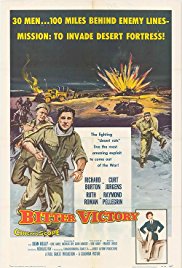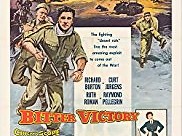Bitter Victory **** (1957, Richard Burton, Curd Jürgens, Ruth Roman) – Classic Movie Review 6698
Curd Jürgens stars as Major David Brand, a jittery, cowardly leader awarded a medal he did not merit for leading a British commando raid on Rommel’s desert fortress headquarters, and Burton as his number two, Captain Jimmy Leith, an officer who has been making love to his wife Jane (Ruth Roman), in cult director Nicholas Ray’s powerful 1957 drama of broken lives in the Second World War.
As a film about cowardice, failure, indecision and angst, Bitter Victory is necessarily gloomy, but it tells a gripping story, and is very effectively performed, especially by Jürgens.
Ray always commands great respect even if he is perhaps not quite at his best here, maybe because the film was made in French and dubbed into English. However, along with the performances, Maurice Le Roux’s dramatic score and Michel Kelber’s black and white Scope images of the Libyan desert are major assets.
The US international release print runs at only 82 minutes. The 103-minute original was restored to glorious effect in 2003 and presented at London’s National Film Theatre.
Jean-Luc Godard called Bitter Victory ‘more than cinema’, ‘a pure reflection of life’.
Also in the cast are Raymond Pellegrin, Anthony Bushell, Andrew Crawford, Nigel Green, Christopher Lee, Alfred Burke, Sean Kelly, Ramón de Larrocha, Fred Matter, Raoul Delfosse, Harry Landis and Ronan O’Casey.
Bitter Victory (Amère Victoire) is made by Transcontinental, released by Columbia, written by René Hardy, Nicholas Ray and Gavin Lambert, based on Hardy’s novel, shot by Michel Kelber, produced by Paul Graetz and Robert Laffont, and scored by Maurice Le Roux.
It was premiered at the Venice Film Festival on 28 August 1957.
© Derek Winnert 2018 Classic Movie Review 6698
Check out more reviews on http://derekwinnert.com



